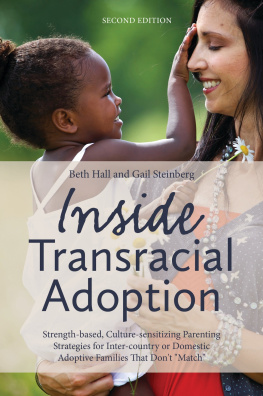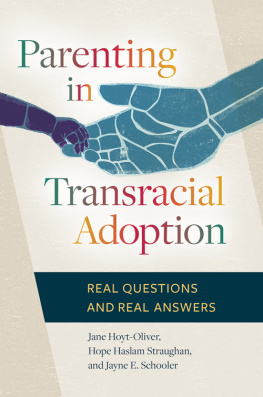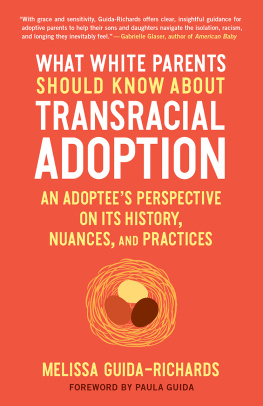COLUMBIA UNIVERSITY PRESS
Publishers Since 1893
New York Chichester, West Sussex
cup.columbia.edu
Copyright 2007 Columbia University Press
All rights reserved
E-ISBN 978-0-231-51235-0
Library of Congress Cataloging-in-Publication Data
Simon, Rita James.
In their parents voices / Rita J. Simon and Rhonda M. Roorda.
p. cm.
ISBN 978-0231-14136-9 (cloth : alk. paper)ISBN 978-0231-14137-6
(pbk. : alk. paperISBN 978-0-231-51235-0 (ebook)
I. Interracial adoptionUnited States. 2. Adoptive parentsUnited States.
I. Roorda, Rhonda M. 1969II. Title.
HV875.64.85577 2007
649.14508900973dc22
2007005678
A Columbia University Press E-book.
CUP would be pleased to hear about your reading experience with this e-book at .
IN THEIR PARENTS VOICES: Reflections on Raising Transracial Adoptees is the second of two volumes on black and biracial men and women who were adopted primarily in the 1970s by white parents when most of the children were younger than 2 years old. In Their Own Voices: Transracial Adoptees Tell Their Stories (2000) reports the experiences of twelve women and twelve men then aged 22 to 31 (with one male outlier who was 57) and who were transracially adopted. The stories of these transracial adoptees were obtained mostly through telephone interviews, with a few done in person. We found participants through referrals from individuals and organizations, responses to an ad in Interrace magazine, and through the Internet. Some initiated contact with us. Some were well-known personalities whom we sought out for interviews. The interviews lasted at least two hours.
The stories told by the adoptees in In Their Own Voices reveal their thoughts about family, adoption, and self-identity issues from their adult perspective. This book substantiates the claims empirically demonstrated by traditional researchers (from the mid-1970s to the early 1990s), primarily in the fields of social work and child development, that love and stability are essential in establishing healthy families, including those families made through transracial adoption. But In Their Own Voices further stretches the reader to ask the critical question: Is love (and stability) enough? Do parents of transracial adoptees have to make changes in their lives, such as the neighborhoods they live in, the churches they attend, and the friends they have?
In Their Parents Voices picks up where In Their Own Voices leaves off, this time drawing from the personal accounts of the adoptive parents, many of whom had the opportunity to read their sons and daughters intimate discussions of their adoptive experience. The parents reflect upon their journeys, which entailed adopting and raising black and biracial children against the backdrop of the civil rights movement and amid the controversy about transracial adoption. In this second volume parents representing sixteen families from the first volume talk candidly about their reasons for adopting, the adoption process, the challenges and triumphs they encountered in raising their children, and the relationships they have with their adult children and, in many cases, with their childrens spouses and children. The parents express their opinions about transracial adoption and the stance taken in the early 1970s in opposition to transracial adoption, and they offer recommendations to other adoptive families who are in the process of raising children of color.
Our research design for this book was similar to the one we used for In Their Own Voices; we primarily interviewed participants by telephone (with the exception of two couples and one parent). The interviews lasted on average 1.5 hours and were then transcribed and mailed to each participant for her or his review and consent before publication.
Although the parents in this volume reflect on the often bitter debates carried on for more than thirty years about the consequences of transracial adoption, it is no longer a factor for families seeking to adopt today. The debate formally ended in 1996 with the passage of the Adoption and Safe Families Act, which in essence stated that race shall not be a factor in adoption.
Unfortunately, statistics about transracial adoption remain difficult to pinpoint. Most would agree that the actual numbers of transracial adoptions of U.S. citizens by U.S. citizens are still very small. Some scholars continue to use data from a 1987 study because of the scarcity of statistical information on transracial adoption; it found that 92 percent of all adoptions involve an adoptive mother and child of the same race In only 8 percent of all adoptions are the parents and children of different races.
TRANSRACIAL ADOPTION
The institutionalized beginnings of transracial adoption of black children in North America trace to the activities of the Childrens Service Center and a group of parents in Montreal, Canada, who in 1960 founded an organization called the Open Door Society.
In the United States 1961 marked the founding of an organization whose original purpose was to provide placements for black children in black adoptive homes. Parents to Adopt Minority Youngsters (PAMY) was founded in Minnesota and worked with the Minnesota Department of Public Welfare. PAMY was one of the first groups formed in the United States along the lines of the Open Door Society and provided similar referral and recruitment services and handled public relations. But PAMYs involvement with transracial adoption, unlike that of the Open Door Society, came as an unexpected by-product of PAMYs original intent, which was to secure black adoptive homes for black children. From 1962 through 1965 approximately twenty black children in Minnesota were adopted by white families through the efforts of PAMY. These adoptive parents seemed not to fit the stereotype of the adoptive family, an infertile couple. For the most part they were not infertile, and they did not regard their act as a substitute for biological parenthood.
By 1969 the United States had forty-seven organizations similar to the Open Door Society. Among the major ones were Families for Interracial Adoption, the Council on Adoptable Children, Opportunity, the National Council of Adoptive Parents, and Adopt-A-Child-Today. Their primary function was to help secure adoptive homes for all parentless children, with particular emphasis on children with special needs, a category that included children of color.
Historically, both private and public adoption agencies have had a bank of white adoptive families larger than the number of available white children. For example, a 1957 study found that at any given time two to eight approved white adoptive homes were available for every white child, whereas only one approved black family was available for every ten to twenty black children.





